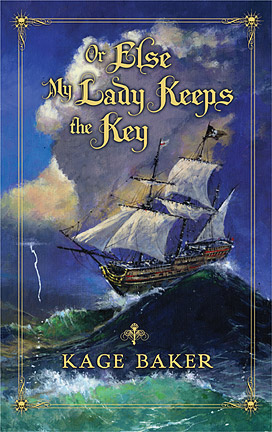 Kage Baker’s short novel, Or Else My Lady Keeps the Key, is not a sequel so much as a continuation of the adventures of John James, fugitive, sometime pirate, and free-lance muscle, who was introduced in her novella “The Maid on the Shore” in Dark Mondays.
Kage Baker’s short novel, Or Else My Lady Keeps the Key, is not a sequel so much as a continuation of the adventures of John James, fugitive, sometime pirate, and free-lance muscle, who was introduced in her novella “The Maid on the Shore” in Dark Mondays.
James has just returned to Port Royal from the sack of Panama with a mere fifty pounds of gain, and a mission to deliver a letter from his friend Tom, who died in the sack, to Mrs. Clarissa Waverly, who had been Tom’s mistress. The letter, as it turns out, contains instructions for finding four thousand pounds of ransom for a prince who is mad and now lost, which Tom had hidden before embarking on his last adventure. So, perforce, John and Mrs. Waverly leave for Leauchaud, where the ransom, according to Tom’s letter, is hidden.
On the way they are, of course, set upon and captured by pirates, and then the pirate ship is lost with all hands on the rocks at an unknown island, save for John, Mrs. Waverly, a freedman named Sejanus, and a clerk, Mr. Tudely, on his way to Barbados. After various adventures, they manage to return to Port Royal.
This reads like the middle portion of a longer work, of which “The Maid on the Shore” would be the beginning. As such, save for the magic of Baker’s prose, it’s not a particularly strong story, but I’m not sure that it has to be. Perhaps that’s simply because of the overwhelming impression that we’re reading a section of a novel, a sort of Bildungsroman of which John James is the protagonist: we expect that eventually — in the next novella perhaps — we will see him comfortably settled as a bricklayer in Jamaica or Barbados. But, given the tenor of this tale, it’s only a maybe.
One thing that is inescapable here is a mordant view of human nature and the possibilities for nobility when the alternative is immediate self-interest, which are slim at best. John seems to be, among his other sterling qualities, the eternal patsy. He is earnest, honest, faithful and not nearly cynical enough — enough to make him real, but not enough that it affects his behavior to any appreciable extent. The same cannot be said for those around him.
The supernatural elements that provided strong resonance in “Maid,” an other-worldly quality to the narrative, are not so pervasive here, and have little effect on the mood of the story. There was a certain surreality there that doesn’t survive here, and I, for one, missed it — it somehow sparked “Maid” up a level, added an air of numinosity to the story that infused the whole tale. There are bizarre, unexplained occurrences here, visions that affect the entire quartet of castaways, but they are somehow discrete events that don’t resonate as did their predecessors.
It’s still a good story — I’m not sure that Baker can turn out one that is less than good — but I find myself making a somewhat strange recommendation: read this one first, because I think that will enable you to get the most out of it. Then go back and look at “Maid on the Shore” and see if you agree with me.
(Subterranean Press, 2008)
